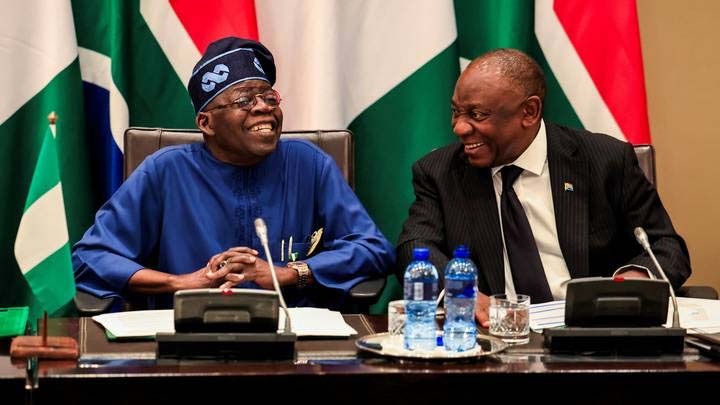Debates are raging over South Africa’s announcement that it is relaxing visa rules for Nigerian nationals planning to visit the country for tourism and business.
President Cyril Ramaphosa made the announcement after he hosted his Nigerian counterpart, Bola Tinubu, last week for bilateral talks to strengthen ties.
Tensions between citizens of the two African giants had previously led to deadly xenophobic attacks in both countries – with business premises raided and goods looted.
Nigeria is the main destination for South African exports and investments in West Africa. On the other hand, South Africa imports Nigerian oil and gas.
South Africa’s economy has not been growing at a rate that supports its rising population and the country is grappling with serious unemployment, ranked among the highest in the world at 30%, according to data from the World Bank and the International Labour Organization in June 2024.
Nigeria is also battling with economic challenges with many citizens leaving the country due to unemployment.
It was therefore no surprise that Ramaphosa, with an eye on drawing interest from Africa’s most populous nation, announced to Tinubu the changes in visa regulations, including extending the visa period for Nigerian business people and the simplification of regulations.
“We look forward to seeing more Nigerian companies investing in South Africa. In fact, we want to see Nigerian products on the shelves of South African shops… Qualifying Nigerian businesspeople can be granted a five-year multiple entry visa,” he said.
“In addition, tourists from Nigeria are now able to apply for a visa without even submitting a passport,’’ Ramaphosa declared.
His Nigerian counterpart Boa Tinubu termed South as “our serious brother’’ and praised the initiative as “the essence of brotherhood’’.
South Africa hosts around 2.3 million migrants, nearly 3% of the population. Some South Africans say foreign nationals, including Nigerians, are taking up local jobs.
The authorities continue to reassure the citizens of more economic opportunities and express confidence in the benefits of having foreign business people and tourists to the local economy.
Ramaphosa’s announcement on relaxation of visa regulations to Nigerian nationals made for uncomfortable listening among sections of South Africans. It was seen as contradictory to the government’s promise to check on irregular migration.
Many also expressed dissatisfaction on social media to the fact that tourists from Nigeria will now be able to apply for a visa without even submitting a passport.
The president’s office quickly moved to “clarify a misunderstanding” on the simplified visa process for Nigerian nationals.
Nigeria’s Access Bank is among the big players in South Africa’s financial sector. Photo / Reuters
It said Nigerian visitors will still have to submit a passport albeit at the latter stages of the visa process.
“The modernisation of the visa application process does not compromise the integrity of the visa system,” it said in a statement.
“Once a visa has been approved, they are required to submit their passports for the process to be completed and for the visa to be affixed in the passport.”
Some analysts say the move by South Africa is a good development as the continent continues its efforts to ease cross-border movements and enhance free trade arrangements.
Trade between African countries is less than 16% and a recent African Union- backed report was critical on the extent to which African countries were open to visitors from other African countries.
Nigerian industrialist Aliko Dangote, Africa’s second richest person, has previously publicized on the difficulty of travelling on a Nigerian passport across the continent.
“As an investor, as somebody who really wants to make Africa great, I have to now apply 35 different visas on my passport. I really don’t have the time to go and be dropping my passport in embassies to get a visa,” he told a forum of African business executives held in September.
South African President Cyril Ramaphosa in January 2024 launched the first shipment under the African Continental Free Trade Agreement (AfCFTA). Photo /AFP
The AU has been pushing member states to create conditions for easing movement of Africans across Africa to make it easier to do business across the continent.
It launched the African Continental Free Trade Area (AfCFTA) in January 2021 to create one of the world’s biggest free-trade areas with a population of more than 1.2 billion people.
However, the reality captured in the visa openness report shows the continent has a long way to go. Only Benin, Rwanda, The Gambia and Seychelles allow visa-free entry for nationals from all African countries.
“Several countries remain reluctant… There remains a long way to go, and much room for progress on visa openness,” Minata Samate Cessouma, AU Commissioner for humanitarian affairs said.
Trending
- EXCLUSIVE: Boko Haram attack Niger villages, slaughter children, burnt down police station
- Shettima: Nigeria ready to partner AU states on health security, sovereignty
- Fubara dedicates award to Wike for discovering him
- 2027 Election: Nigerians slam INEC for fixing polls in Ramadan
- INEC schedules dates for 2027 general elections
- National Assembly to harmonise electoral bill Monday as debate over electronic transmission intensifies
- African leaders shouldn’t be above age 50 —Jonathan
- Justice Egwuatu steps down from Malami’s trial over ‘personal reasons’
- Tinubu names Ismail Abba Yusuf new NAHCON chair, seeks Senate confirmation
- Appeal Court to hear suits challenging PDP’s Ibadan Convention Thursday



